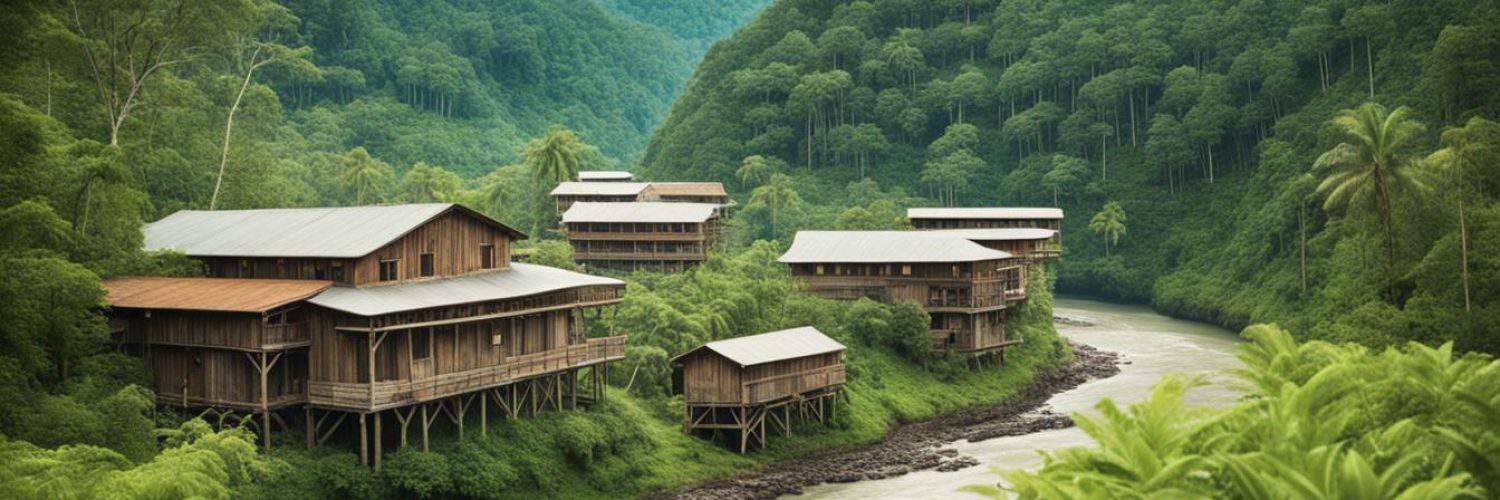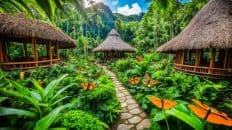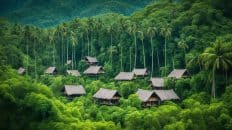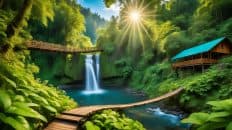Have you ever heard of a prison without walls? A correctional facility where inmates are surrounded by nature instead of concrete? Welcome to the Iwahig Penal Colony in Palawan, Philippines. This unique penal rehabilitation center challenges the traditional concept of incarceration and offers a distinctive approach to inmate reformation.
Established in 1904 during the American occupation, the Iwahig Penal Colony is one of the world’s largest open-air jails. Instead of being confined within prison walls, the inmates at Iwahig are immersed in a vast natural setting, encompassing a coastal mangrove forest and a mountain range. This unique setup fosters a more humane and community-based environment for their rehabilitation, focusing on restorative justice and providing opportunities for learning and skill development.
Join us as we explore the fascinating history, unique features, and various rehabilitation programs of the Iwahig Penal Colony. Discover how the prison’s sustainable living practices and emphasis on community integration are transforming the lives of inmates, challenging preconceived notions of conventional penitentiaries. Are traditional prison walls really necessary for successful inmate rehabilitation? Let’s find out.
Key Takeaways:
- The Iwahig Penal Colony in Palawan, Philippines offers a unique approach to penal rehabilitation, with inmates surrounded by nature instead of traditional prison walls.
- The prison’s focus is on restorative justice, providing opportunities for learning and skill development to help inmates reintegrate into society.
- Inmates at Iwahig are actively involved in farming, fishing, and carpentry, equipping them with practical skills for a successful reintegration.
- Community integration and restorative justice principles are key aspects of the prison’s philosophy, fostering responsibility and positive change among inmates.
- The Iwahig Penal Colony serves as a popular tourist attraction, offering visitors a unique insight into alternative prison systems and sustainable living practices.
History of Iwahig Penal Colony
The Iwahig Penal Colony has a rich history that traces back to the American colonial period in the Philippines. It was during this time that Puerto Princesa, Palawan, was designated as a penal settlement for offenders sentenced to banishment. However, the establishment of the prison facility took place later, during the American occupation.
On November 16, 1904, Governor Luke Wright authorized the creation of the Iwahig Penal Colony on an initial area of 22 acres. The need for this penal colony arose from the overcrowding at the Bilibid Prison in Manila, as it could no longer accommodate all the prisoners. Lieutenant George Wolfe, a member of the U.S. expeditionary force, served as the first superintendent of the Iwahig Penal Colony.
Inspired by the George Junior Republic model, the penal settlement aimed to provide prisoners with an opportunity for rehabilitation through land cultivation. Over the years, the prison expanded, and self-government was established within the colony. This allowed the colonists to govern themselves and elect their own officials, fostering a sense of community and empowerment.
Through its transformative history, the Iwahig Penal Colony has become a testament to the potential for reformation and rehabilitation within the criminal justice system.
“The Iwahig Penal Colony emerged during the American colonial period in the Philippines, serving as a unique penal settlement that offered prisoners an opportunity for rehabilitation through land cultivation.”
Unique Features of Iwahig Penal Colony
The Iwahig Penal Colony is known for its distinctive features that set it apart from traditional prisons. Unlike enclosed concrete facilities, Iwahig operates as an open-air jail surrounded by a wire fence, offering a unique and refreshing environment for the inmates.
The prison’s location amidst a coastal mangrove forest and a mountain range creates a serene and natural atmosphere, promoting a sense of peace and tranquility that can aid in the rehabilitation process. Inmates have the opportunity to connect with nature, enjoying the fresh air and beautiful surroundings.
One of the notable aspects of the Iwahig Penal Colony is its emphasis on sustainable living. Inmates actively participate in farming, fishing, forestry, and carpentry activities, contributing to the prison’s self-sufficiency and promoting the development of practical skills.
The prison operates under a strict self-governance system, where inmates are responsible for their assigned tasks and the maintenance of order within the community. This approach fosters a sense of responsibility and accountability, helping inmates become productive members of the prison society.
The Integrated Approach to Inmate Integration
Inmate integration is a key principle at the Iwahig Penal Colony. The prison employs a unique system where minimum-security inmates supervise and support medium-security inmates. This integrated approach encourages a sense of camaraderie, teamwork, and shared responsibility among the inmates.
| Unique Features of Iwahig Penal Colony | Benefits |
|---|---|
| Open-air jail surrounded by a wire fence | Provides a refreshing and natural environment |
| Sustainable living practices | Promotes self-sufficiency and practical skill development |
| Strict self-governance system | Fosters responsibility and accountability |
| Inmate integration through minimum-security inmate supervision | Fosters camaraderie, teamwork, and shared responsibility |
“The Iwahig Penal Colony provides inmates with a unique and humane environment that promotes their reformation and successful reintegration into society.”
The combination of these unique features and the integrated approach to inmate integration makes the Iwahig Penal Colony a one-of-a-kind correctional facility that prioritizes the well-being and development of its inmates.
Inmate Activities and Vocational Training
At the Iwahig Penal Colony, inmates are actively engaged in a range of activities and vocational training programs that promote their rehabilitation and reintegration into society. Through these programs, inmates not only acquire practical skills but also develop a sense of purpose and accomplishment.
Practical Skills for a Brighter Future
As a self-sustaining prison, Iwahig allows inmates to participate in various agricultural and vocational activities. Inmates cultivate agricultural lands, tending to rice paddies, coconut plantations, corn fields, and vegetable plots. This hands-on experience in farming provides them with valuable skills and knowledge in crop cultivation, land management, and sustainable agriculture.
In addition to farming, inmates at Iwahig engage in fishing activities. They learn various fishing techniques, such as net casting and hook and line fishing, which can be utilized for their livelihoods after release.
Carpentry work is another important skill taught to inmates. Through carpentry training, they acquire proficiency in woodworking, construction, and furniture making. This training equips them with marketable skills for employment in the construction industry, contributing to their successful reintegration into society.
Rebuilding Lives Through Vocational Training
The vocational training programs offered at Iwahig Penal Colony play a vital role in preparing inmates for life after their release. By equipping them with practical skills, these programs increase their chances of finding employment and becoming financially independent.
The training programs go beyond mere skill development; they instill a sense of purpose and self-worth in the inmates. These vocational activities help foster a productive mindset, allowing inmates to see themselves as capable individuals capable of positively contributing to society.
“The vocational training programs offered at Iwahig provide inmates with more than just practical skills; they offer hope and a chance for a better future.” – Prison Administrator John Santos
Inmate Activities and Vocational Training
| Activities | Skills Acquired |
|---|---|
| Farming | Crop cultivation, land management, sustainable agriculture |
| Fishing | Various fishing techniques, net casting, hook and line fishing |
| Carpentry | Woodworking, construction, furniture making |
The vocational training and engagement in productive activities at Iwahig Penal Colony promote productivity, self-sufficiency, and a sense of accomplishment among inmates. This approach not only enhances their rehabilitation but also empowers them with the necessary skills and mindset for a successful reintegration into society.
Community Integration and Restorative Justice
The Iwahig Penal Colony takes a unique approach to inmate reformation by prioritizing community integration and restorative justice. The prison recognizes the importance of connecting inmates with the community in a positive and productive manner as they prepare for their eventual reintegration into society.
Through various initiatives, the colony encourages inmates to engage in vocational training, work on community projects, and participate in inmate-led activities. These opportunities instill a sense of responsibility, belonging, and purpose among the inmates, fostering personal growth and positive change.
“The true measure of any society can be found in how it treats its most vulnerable members.” – Mahatma Gandhi
Restorative justice principles permeate the philosophy of the Iwahig Penal Colony. Rather than focusing solely on punishment, the prison seeks to address the root causes of criminal behavior and promote rehabilitation and reformation. By taking a holistic approach, the colony aims to create a supportive environment conducive to inmate transformation and successful reintegration.
Promoting a Sense of Responsibility and Belonging
One of the key aspects of community integration at the Iwahig Penal Colony is the active involvement of inmates in vocational training programs. By acquiring practical skills in farming, fishing, carpentry, and other trades, inmates gain marketable skills that can contribute to their successful reintegration into society.
The prison also emphasizes the importance of self-governance and inmate-led activities. Minimum-security inmates are assigned to supervise medium-security inmates, fostering a sense of responsibility and mutual support within the inmate community.
Fostering Positive Change through Restorative Justice
Restorative justice forms the foundation of the Iwahig Penal Colony’s rehabilitation approach. The colony aims to address the underlying causes of criminal behavior and foster personal growth and introspection among inmates.
By providing opportunities for inmates to connect with the community in meaningful ways, the prison encourages them to take accountability for their actions and actively contribute to society. Through restorative justice practices, inmates have the opportunity to repair the harm caused by their actions and rebuild trust with their communities.
Transforming Lives for a Brighter Future
The emphasis on community integration and restorative justice at the Iwahig Penal Colony plays a vital role in inmate reformation. By providing opportunities for personal growth, skill development, and community involvement, the prison sets the stage for inmates to reintegrate successfully into society.
This transformation not only benefits the individuals leaving the prison but also contributes to safer and more cohesive communities. By embracing community-based corrections and restorative justice principles, the Iwahig Penal Colony paves the way for a brighter future for both inmates and society as a whole.
Unique Rehabilitation Programs
The Iwahig Penal Colony takes a unique approach to inmate rehabilitation by offering a range of programs focused on skill development and education. Through these initiatives, the prison aims to equip inmates with the necessary tools to reintegrate successfully into society.
Vocational Training
The prison provides vocational training programs in various trades such as farming, fishing, and carpentry. Inmates have the opportunity to gain practical skills in these areas, making them more employable upon their release. By acquiring marketable skills, inmates can increase their chances of finding sustainable employment and leading productive lives.
Education Programs
The Iwahig Penal Colony recognizes the importance of education in the rehabilitation process. Inmates have access to literacy classes, technical courses, and other forms of educational support. These programs not only improve inmates’ knowledge and skills but also contribute to their personal growth and self-esteem. Education plays a vital role in expanding inmates’ horizons and opening up new opportunities for them.
“The vocational training and education programs offered by the Iwahig Penal Colony are invaluable for inmates. These initiatives not only equip them with practical skills but also empower them with the knowledge and confidence to rebuild their lives.”
Empowering Inmates for Successful Reintegration
By providing unique rehabilitation programs, the Iwahig Penal Colony aims to empower inmates and help them achieve successful reintegration into society. The acquisition of skills and education fosters personal growth and self-reliance, setting inmates on a path towards a more productive and law-abiding future.
Inmate Income and Financial Management
Inmates at the Iwahig Penal Colony have the opportunity to earn income through their participation in productive activities. The colony generates income through farming, handicraft production, and other economic ventures.
By being involved in these income-generating activities, inmates not only develop practical skills but also have the chance to contribute to the financial sustainability of the prison.
What sets the Iwahig Penal Colony apart is its approach to managing inmate income. When inmates generate income, a portion of it is allocated to them and kept in a trust account. This account is managed by the prison authorities, ensuring that inmates have some savings upon their release. It serves as a financial resource to support their reintegration into society.
Financial management is a crucial aspect of inmate rehabilitation, as it helps individuals gain valuable skills in maintaining and budgeting their finances. The trust account system at the Iwahig Penal Colony promotes responsible financial management among inmates, preparing them for life beyond the prison walls.
Overall, the inmate income and financial management practices at the Iwahig Penal Colony play a crucial role in equipping inmates with financial skills and resources that contribute to their successful transition back into society.
Challenges and Criticisms
While the Iwahig Penal Colony has received praise for its unique approach to prison rehabilitation, it is not without its challenges and criticisms.
Transparency in the management of the prison has been a subject of concern, particularly regarding the income generated by the prison’s economic activities. Allegations of political patronage and bribery influencing certain aspects of the prison’s operations have also been raised.
Additionally, some individuals have criticized the prison’s regulations, including restrictions on prisoners’ living arrangements and limited visitation opportunities for families. These criticisms highlight the need for improvements in the management and transparency of the prison system.
Tourist Attraction and Cultural Impact
One of the reasons why the Iwahig Penal Colony in Palawan has gained popularity among tourists is its unique setup and the cultural impact it has made in the region. Visitors have the opportunity to witness the innovative approach to rehabilitation and learn about the sustainable living practices implemented within the prison community.
When visiting the Iwahig Penal Colony, tourists can interact with the inmates and gain a deeper understanding of the unique rehabilitation programs offered. This firsthand experience allows visitors to witness the transformative potential of restorative justice and how it positively contributes to offender reformation.
The Iwahig Penal Colony is also known for its production of finely handcrafted souvenir items. Inmates at the prison showcase their artistic skills by creating bags and various handicrafts. These items have become sought-after souvenirs among tourists, as they not only serve as personal keepsakes but also represent the inmates’ journey of rehabilitation and self-discovery. Purchasing these items not only supports the inmates financially but also contributes to their reintegration process.
The unique cultural impact of the Iwahig Penal Colony extends beyond its role as a tourist attraction. It serves as a symbol of rehabilitation, integration, and community-based corrections in the Philippines.
The prison’s commitment to restorative justice and sustainable living has made a significant impact on Palawan’s cultural landscape. It demonstrates that rehabilitation can go beyond traditional punitive measures and instead focus on fostering personal growth, responsibility, and productive contributions to society. The Iwahig Penal Colony stands as a testament to the power of community-based corrections in shaping a brighter future for both offenders and the community as a whole.
Future Developments and Preservation Efforts
As the Iwahig Penal Colony continues to evolve, there are ongoing efforts to preserve its unique setup and promote sustainable tourism. The prison authorities are focused on improving transparency and management practices to address criticisms and ensure the effective rehabilitation of inmates.
Plans for future developments include:
- Expanding vocational training programs to provide inmates with a wider range of marketable skills.
- Enhancing educational opportunities to support inmates’ personal and intellectual growth.
- Promoting sustainable living practices within the prison community, such as waste reduction and energy conservation.
Collaboration with external organizations and stakeholders is also underway to support the preservation of the cultural heritage of the prison and its integration into the wider tourism landscape of Palawan.
In the words of the prison authorities:
“We are committed to preserving the unique setup of the Iwahig Penal Colony while striving to make it a sustainable and responsible correctional facility. We believe that by investing in the future of our inmates and collaborating with external partners, we can contribute to their successful reintegration into society and showcase the beauty of Palawan through sustainable tourism.”
Preservation Initiatives
Preservation efforts at the Iwahig Penal Colony focus on:
- Conservation of the surrounding natural environment, including the coastal mangrove forest and the mountain range.
- Restoration and maintenance of historical buildings within the prison compound.
- Documentation and promotion of the cultural heritage of the prison through exhibitions and educational programs.
These preservation initiatives not only safeguard the prison’s unique identity but also contribute to the sustainable tourism industry in Palawan by offering visitors a glimpse into the history, culture, and sustainable practices of the penal colony.
Importance of Community-Based Corrections
The Iwahig Penal Colony showcases the significant role of community-based corrections in the fields of crime prevention and offender rehabilitation. Unlike traditional prison systems, Iwahig creates a supportive and community-oriented environment that fosters personal growth, skill development, and responsible citizenship among its inmates.
By prioritizing restorative justice principles, vocational training, and cooperative living, the Iwahig Penal Colony successfully reintegrates offenders into society, reducing the likelihood of recidivism. Inmates are given opportunities to acquire practical skills, participate in meaningful activities, and contribute to the community.
The adoption of community-based corrections approaches can lead to improved outcomes for individual offenders and contribute to the creation of safer and more cohesive communities as a whole. By focusing on rehabilitation rather than punishment alone, community-based corrections offer a path for offenders to rebuild their lives, make positive changes, and become productive members of society.
Community-based corrections systems like the Iwahig Penal Colony highlight the importance of treating offenders with respect, providing them with pathways for personal development, and instilling a sense of accountability for their actions. These systems recognize that rehabilitation and reintegration are crucial steps toward breaking the cycle of crime and promoting long-term community safety.
The Role of Penal Rehabilitation in Palawan Tourism
The unique community setup and sustainable rehabilitation programs offered by the Iwahig Penal Colony have made it an integral part of Palawan tourism. The prison serves as a unique attraction for visitors interested in exploring alternative prison systems and learning about restorative justice principles.
The colony’s commitment to sustainable living practices, cultural heritage preservation, and community integration aligns with the growing trend of sustainable tourism in Palawan. By promoting responsible and ethical tourism, the prison contributes to the preservation of the natural environment and cultural heritage of Palawan while offering a transformative experience for visitors.
“The Iwahig Penal Colony stands as a testament to the power of community-based corrections in achieving both offender rehabilitation and crime prevention. Through its unique approach and sustainable programs, the prison not only supports the reformation of individuals but also plays a vital role in the development of Palawan’s tourism industry.”
Sustainable Tourism Initiatives
Palawan, known for its stunning natural landscapes and biodiversity, has embraced sustainable tourism as a means of preserving its pristine beauty for future generations. The Iwahig Penal Colony, with its sustainable living practices and community integration efforts, aligns with the principles of sustainable tourism.
Visitors to the prison have the opportunity to witness firsthand the positive impact of restorative justice and sustainable living. By engaging with the inmates and supporting their rehabilitation journey, tourists contribute to the social and economic growth of the local community.
Cultural Heritage Preservation
The Iwahig Penal Colony also plays a vital role in preserving the cultural heritage of Palawan. Through the production of handcrafted souvenirs and the showcasing of traditional crafts, the prison contributes to the promotion and preservation of local arts and culture.
Further efforts are being made to integrate the cultural heritage of the prison into the wider tourism landscape of Palawan. Collaboration with external organizations and stakeholders ensures that the unique history and traditions of the Iwahig Penal Colony are celebrated and shared with visitors.
A Transformative Experience
Visiting the Iwahig Penal Colony offers a transformative experience for tourists. Witnessing the power of rehabilitation and observing the positive impact of restorative justice principles can be enlightening and thought-provoking.
By engaging with the inmates and experiencing their creative endeavors, such as the production of handicrafts, visitors gain a deep appreciation for the resilience, talents, and potential of individuals within the criminal justice system.
The Role of Penal Rehabilitation in Palawan Tourism
| Benefits | Example |
|---|---|
| Preservation of natural environment | The sustainable living practices of the Iwahig Penal Colony contribute to the preservation of Palawan’s biodiversity. |
| Cultural heritage preservation | The production of handcrafted souvenirs by the inmates showcases the rich cultural heritage of Palawan. |
| Educational and transformative experience | Visiting the prison allows tourists to gain insights into restorative justice and witness the power of rehabilitation. |
| Positive community impact | By supporting the rehabilitation efforts of the Iwahig Penal Colony, tourists contribute to the growth and development of the local community. |
| Alignment with sustainable tourism principles | The prison’s focus on sustainable living practices aligns with the growing trend of responsible and ethical tourism in Palawan. |
Conclusion
The Iwahig Penal Colony in Palawan, Philippines, is a shining example of effective penal rehabilitation and community integration. With its unique setup, restorative justice focus, and commitment to sustainable living, the prison provides inmates with an environment conducive to personal growth and successful reintegration into society. The vocational training programs and inmate income management contribute to the restoration of offenders, while the community integration initiatives foster responsible citizenship.
In addition to its impact on inmates, the Iwahig Penal Colony plays a significant role in the cultural heritage of Palawan and the region’s sustainable tourism landscape. Its success as a tourist attraction allows visitors to learn about alternative prison systems and experience the transformative power of community-based corrections. By promoting responsible and ethical tourism, the prison contributes to the preservation of Palawan’s natural environment and cultural heritage.
The Iwahig Penal Colony serves as a testament to the importance of embracing sustainable rehabilitation programs and community integration in the prison system. Its innovative approach offers hope for the restoration of offenders and the prevention of recidivism. As society continues to acknowledge the value of restorative justice and sustainable living, the Iwahig Penal Colony stands as a beacon of progress, inspiring other correctional facilities to follow suit.


















Add comment